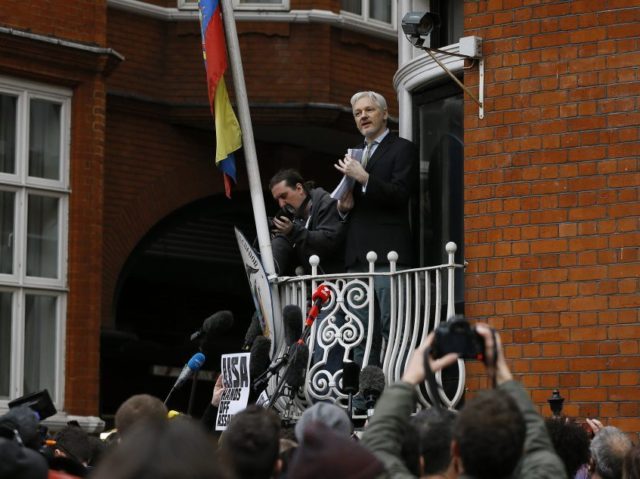The organization Wikileaks is claiming that U.S. Secretary of State John Kerry personally pressured the government of Ecuador to cut its founder Julian Assange’s internet access, preventing further publication of private emails from the account of Clinton campaign chairman John Podesta.
On Tuesday, the Wikileaks Twitter account accused Kerry of using his position as head of the State Department to demand that the leftist South American government disconnect Assange’s internet access. Assange has lived in the Ecuadorian embassy in London for the past four years. If true, Kerry’s authority to make such a request would be dubious, as the hacked emails in question are not government correspondence, but private emails by partisan political campaign officials.
According to Wikileaks, Kerry met with “Ecuador” – potentially President Rafael Correa – in September and requested they shut down Assange’s operation out of their embassy.
BREAKING: Multiple US sources tell us John Kerry asked Ecuador to stop Assange from publishing Clinton docs during FARC peace negotiations.
— WikiLeaks (@wikileaks) October 18, 2016
The John Kerry private meeting with Ecuador was made on the sidelines of the negotiations which took place pricipally on Sep 26 in Colombia.
— WikiLeaks (@wikileaks) October 18, 2016
The New York Times reports that the government of Ecuador replied to inquiries regarding the accusation with “a polite reference to the mission’s website and to a brief statement.”
“In view of recent speculations, the government of Ecuador reaffirms the validity of the asylum granted four years ago to Julian Assange,” the statement to the Times said. “We also ratify that the protection given by the Ecuadorean state will continue while the circumstances that led to the granting of asylum remain.”
The Times notes that Correa has stated publicly that, if he were able to vote in the 2016 presidential election, he would choose Hillary Clinton.
Update: The State Department has denied this allegation.
.@StateDept @statedeptspox John Kirby denies that @JohnKerry leaned on Ecuador to cut off Julian Assange's internet access pic.twitter.com/YG36ym8ovf
— Ernesto Londoño (@londonoe) October 18, 2016
Wikileaks announced on Monday that Assange had lost his internet access, but has since published two more email dumps from Podesta’s account.
Kerry was in Cartagena, Colombia on September 26 to attend the symbolic signing of a peace deal between that nation’s government and the Revolutionary Armed Forces of Colombia (FARC), a terrorist group. As a leftist ideologically aligned with the FARC, Correa was also in town to celebrate the deal, concocted the terrorists’ safe haven in Havana, Cuba.
The terrorist “peace” deal would have seen the FARC use its cocaine-trafficking funds to establish a political party, and would have allowed most of its members to avoid prison time. As per the Colombian constitution, such a deal required a national vote to pass. Colombians rejected the peace deal, leaving the status of the FARC in limbo but preventing the terror group from establishing a Hezbollah-like political contingency in the Colombian Congress.
In Cartagena, Kerry told reporters that the United States would consider removing the FARC from the State Department’s list of Foreign Terrorist Organizations if the deal passed. The FARC conflict has killed an estimated 200,000 people, with another 100,000 missing.
In addition to allegedly discussing Wikileaks with Correa, Kerry met with another authoritarian leftist during his visit: Venezuela’s Nicolás Maduro, whose government described the Kerry meeting as “respectful.”
Julian Assange has been living in the Ecuadorian embassy since 2012, after being accused of sexual crimes in Sweden, including forcing himself on multiple women and refusing their demands to use protection. Assange will be extradited to Sweden if he steps outside of the embassy, which is legally considered Ecuadorian, and not British, soil.

COMMENTS
Please let us know if you're having issues with commenting.